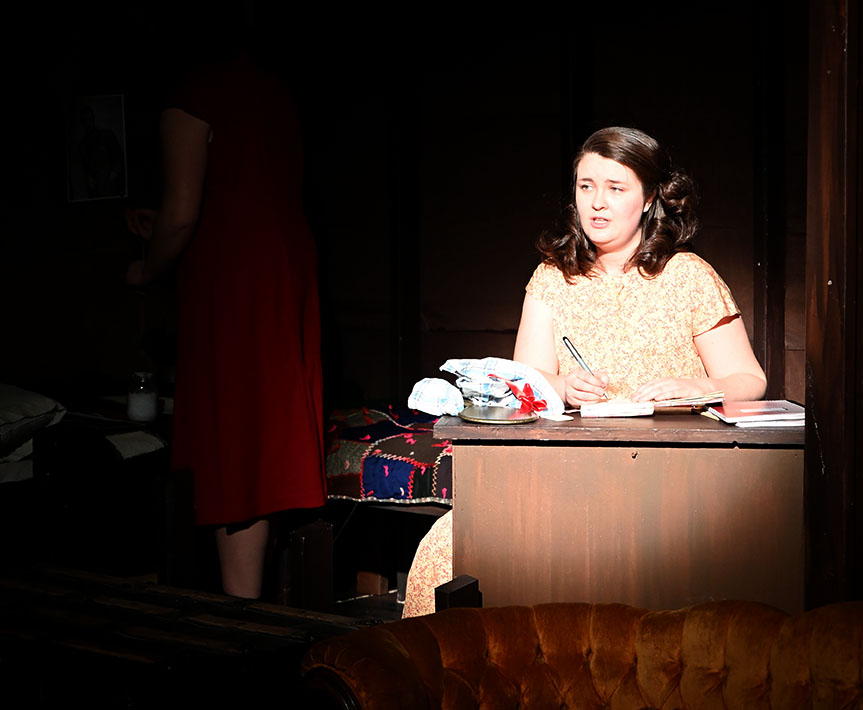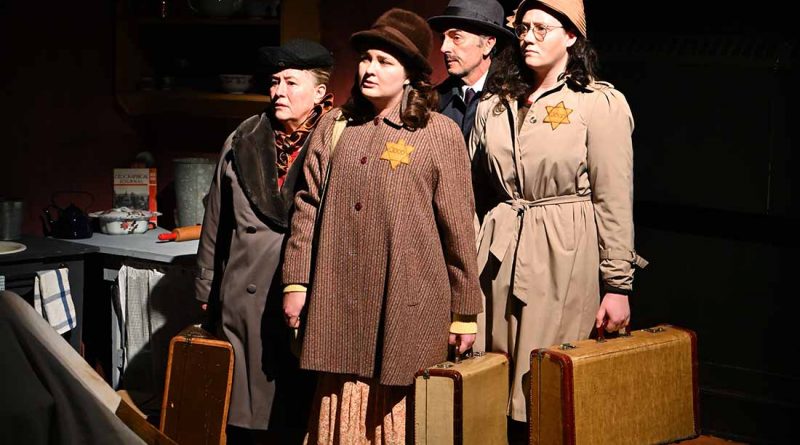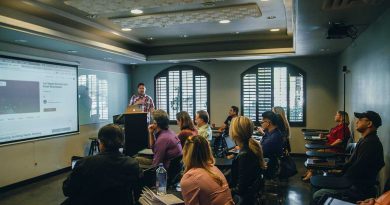A Diary Of Our Time?
By John Swartz
If you want to know what the sound of 100 people in a room is like when attention is fully engaged on a spectacle occurring in front of them, Mariposa Arts Theater’s Diary of Anne Frank (at the Opera House) is a good place to find out. Silent. Eerily silent. You can hear the dust settling.
Such is the power of the play. Nothing really happens in the play. There is no motivating action in the first act that sets the tone, a situation to resolve, a jam for central characters to get out of. There is no goal because the 8 characters trapped by war cannot do anything for themselves, except fight with each other – and that would be antithetical to the survival they cling to.
They are Jews, a family of four, another of three, and a friend hiding from the Nazis in occupied Netherlands. This play is a character study of how people cope with the knowledge of their likely fate. There is hope on display, but a dropped anything at the wrong time, a cough, any noise during daylight hours will give them all up. As it is, only the weakest of the group, Otto Frank, Anne’s father survived.
For the sake of a few months they all may have lived, but were turned in by someone to the Gestapo.
The quick take-a-way is if one has to be cooped up with others, there’s a certain type of person one could do without. Here it is Auguste van Pels, wife of Hermann, mother of Peter; she is of the second family forced into hiding. She is the kind of person, who despite reality can’t reconcile her situation with the world she has constructed in her head, which makes life less endurable for everyone else. Hermann, is not that much better, but he can be reasoned with.
There is little tension among the characters otherwise, except for familiar squabbles that blow over as soon as they occur. The tension is between the stage and the audience. We know the ending and are fascinated with the events of the play. The ending is horrible, and it’s hard to fathom two things, how these people lived in these circumstances, and people just like us could be so cruel to others like the Franks, the van Pels, and a whole ethnicity.
A Story For Our Time
What makes this story more compelling is living in the time we do. I asked producer John Caryl why this play at this time. His answer was the one I might have given in his shoes – look at what is happening now; it’s relevant if you are paying attention.
“I think it’s a story that as to be continued to be told,” said Jim Cotnam, who played the dentist and proposed the play to MAT a year ago. He also said he was stunned to learn how many people had no knowledge of the Holocaust or the conditions making it possible. “We are witnessing that beginning again.”
This is the power of great literature, how simple stories can outlive the era composed in and resonate in another time.
People are funny, weird funny. As a group it’s too easy to dismiss the signs of impending doom because collectively we don’t want to admit the wheels are coming off society. On the surface, things appear fairly normal, even if radically different, because daily life is only undergoing incremental modification when examined individually. Our attention is redirected by those pointing fingers at bogeymen, so everything’s is fine, it’s only temporary, things will get back normal.
It’s not our rights are being curtailed or taken away completely, or there’s too much happening from too many angles to comprehend the weight of what is happening; it’s simply because the sheer volume of change only affects each of us in bits and pieces. There is no universal suffrage. That is, until we all wake up one day to find out the tiny lifeboat we’ve deluded ourselves we occupy alone is filled with the entirety of society.
This is how the Franks and the van Pels found themselves in their final haven. Years of incremental change and denial merged suddenly into world war and they, their tribe, was made to pay.
If you recognize these things, congratulations. If it doesn’t resonate, you really need to read trusted sources of news and information because it’s all sitting right in front of you, if you look. That we are going through exactly the same thing right now is not lost on this writer, the producers, the director Ron Payne, the actors and those who have seen the Diary of Anne Frank. Some of us, Canadians, are paying attention and it’s frightening. An unchanged road ahead leads us back to the conditions necessitating The Diary of Anne Frank, if we don’t wake up.

The difference this time, the general populace can’t plead ignorance; “We didn’t know.” Not in this information age. The only way to excuse one’s self from awareness is to deliberately ignore the problem.
I’m sure there are people who sat in audiences this week who left the theater thinking a little more deeply, seeing the comparison of an early 1940s Europe to today. The greatest service Canadian theater companies can do before the fall election is to clear their decks and produce this play in every community from the Atlantic to the Pacific. We need the reminder of a simple story to wake us from our doldrums to face the reality unfolding in the shadows.
Everyone involved with MAT should be commended for doing this play at this time. It is no accident of scheduling. There are still are a few tickets left for both this and next Sunday’s matinees, and performances next week. Get them at the Opera House box office, 705-326-8011.
(Photos by Mike Beresford, Mariposa Arts Theater)
![]()



![]()




